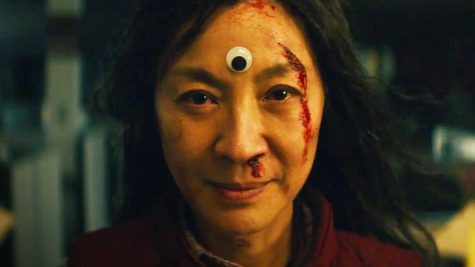Everything Everywhere All At Once is NOT a Sci-Fi
Warning: Review Contains Heavy Spoilers
Everything Everywhere features a hilarious subplot about the Wang’s experience with tax fraud and the stress that it has put on their relationships with each other.
Everything Everywhere All At Once is not a sci-fi film, despite what any online plot summaries might say. To put it frankly, it is the ultimate coming out story, and though it is true that that term is often used in connotation with the queer community, in this sense it means a true discovery and admission of oneself. The film follows Evelyn, a Chinese immigrant who owns and operates a failing laundromat in America. Throughout the movie, she contends with her daughter’s sexuality and rebellious nature, her ever-present disinterest in her husband, her inability to properly do taxes, her tense relationship with her father, and her feelings of failure and irrelevance.
The movie is split into three parts, each discussing a unique aspect of the film, diving even deeper into the true plot line, which is withheld from the audience until the very end. The first part, Everything, is an introduction to the multiverse and the main villain of said multiverse, Jobu Tupaki. Tupaki was from the first universe to discover how to travel across the multiverse, the lead scientist of this technology, Evelyn, pushed Tupaki’s mind too far and Tupaki was split between every universe, sentenced to living all of her lives at once. Alpha-verse, the universe that Tupaki is from, is undertaking a mission to destroy her before she destroys any more universes. At the end of this section, it is revealed that Tupaki is none other than Joy, Evelyn’s daughter. This section was a beautiful introduction to the world created by directors Daniel Kwan and Daniel Scheinert. In the second part, Everywhere, Evelyn has split her mind, joining her daughter in the chaos. She sets herself to the task of defeating Jobu and saving her universe’s Joy, preserving her original life. Evelyn struggles in this section with the other possibilities for her life, which she became a singer or a famous kung-fu master. She is at war with herself and starts questioning whether marrying her husband, Waymond and moving to America was the right choice. Waymond told her that he wanted a divorce, believing that they no longer made each other happy. Evelyn is shocked, her family is falling apart around her, her very reality is crumbling and she struggles to decide where she wants her life to go. Eventually, Tupaki takes her to see her ultimate weapon, the Everything bagel, containing everything in the universe. In it Evelyn discovers a simple truth: there is no meaning to any of it and there will always be something to make humans feel even more insignificant. Jobu reveals that she had been seeking out Evelyn because she wanted to find someone who understood the torture she had been living through. The bagel was not a weapon but rather a suicide button that she didn’t want to press alone. Joy wanted to die with Evelyn. The moving part comes when Waymond stops Evelyn from doing so, asking her to choose kindness instead of violence, instead of anger. She takes this wisdom and fixes all of the problems she has caused in the other universes. She reconciles with Waymond, tells her father about Joy’s sexuality, and stands up to him about his emotional abuse. She even helps a fellow chef recover his raccoon friend. Evelyn fights to stop Joy from entering the bagel, but after an emotional outburst from Joy in which she begs her mother to let go, Evelyn does.

What was especially invigorating about this film was its honest look into the lives of first and second-generation immigrants, especially the harsh expectations placed on the children of immigrants. The Daniels did an excellent job at properly representing both Joy and Evelyn’s need to escape not only their lives but each other. Joy’s character was especially true to the current generation, she was depressed, alone, and scared, but most of all she was tired. She is tired of trying and getting nowhere, all she wants is to be heard, wanting her mother to understand her. Joy wants her mother to fight back, but in reality, she needs her mother to let her go. This does not mean in the way that Evelyn’s father let her leave China, but rather in the way that a mother lets go of their child when teaching them to ride a bike. She needs her mother to marvel at her successes, allow her to fall, and be there to help her try again.
Existence is painful, and this film reveals that we cannot be told to stay, rather, we must be offered a place to stay if we wish. After going through the bagel, Joy reaches a hand back out, coming back to her family. Evelyn and Joy stay together because they want to. Joy came back because she realized that living in insignificance with the people you love is the most significant thing a person can ever do. The people around them, the lives they touch, the people they love: these are their reasons for existence. Living is hard, and family is hard, but giving up is harder. Joy decides not to give up, she decides to fight for her place in the multiverse and returns to her life with her mother.
Evelyn declares to the world that her life, though complicated and disappointing, is utterly hers. She accepts her failures and recognizes her successes, the most beautiful and important part of her existence. The Oscars have been known to nominate movies that reuse plotlines and tell tired stories. This is not one of those stories. While the cinematography is beautiful and the acting is out of this world, it is the brutal honesty of the film that marks it legendary. Never before has something been created that so dramatically addresses the utter disappointment of existence while also recognizing the only real reason for it. Everything Everywhere All At Once is about one rock following the other off a cliff so that neither is alone.










